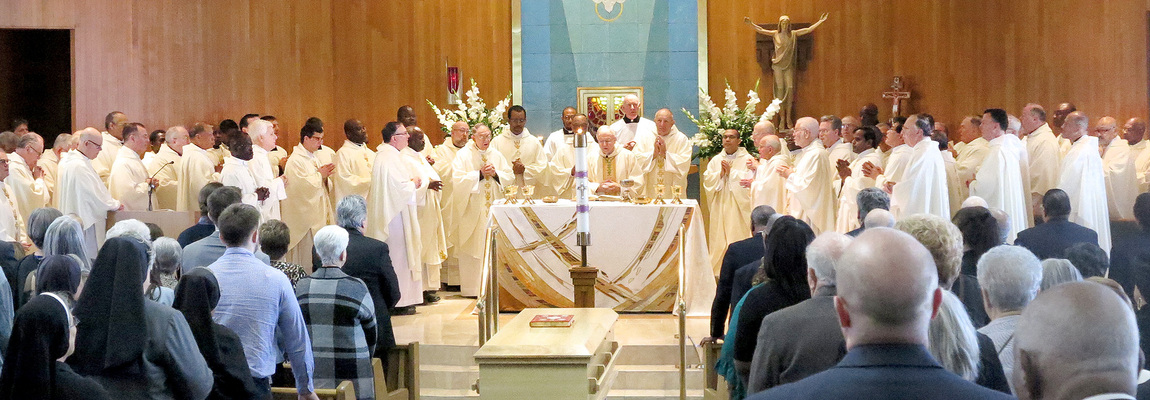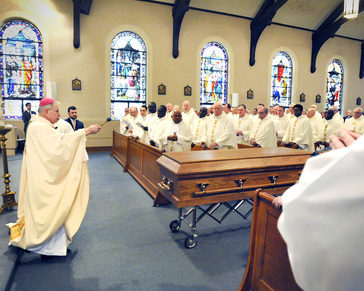
A platform that encourages healthy conversation, spiritual support, growth and fellowship

NOLACatholic Parenting Podcast
A natural progression of our weekly column in the Clarion Herald and blog

The best in Catholic news and inspiration - wherever you are!
Archdiocese clarifies funeral guidelines
-

Story by Peter Finney; file photos by Frank Methe, Clarion Herald
After extensive consultation with priests, deacons and local funeral directors, the Archdiocese of New Orleans has released an updated policy on the celebration of funerals that clarifies church practice when a family chooses cremation, encourages celebrating the funeral liturgy in the parish of the deceased and reiterates that the “words of remembrance” offered by a relative or family friend should take place before the funeral liturgy begins.“We’re praying for the soul of the deceased and also praying for ourselves and the loss we are suffering,” said Father Nile Gross, director of the archdiocesan Office of Worship, who led the review of funeral policies in the archdiocese. “We’re also recognizing that we, too, will die one day, and, hopefully, this will be a moment of conversion, especially for people who maybe haven’t been to church in awhile.”
Cremation has increased
One of the major points of emphasis of the policy, which takes effect Jan. 1, 2021, deals with church teaching on cremation, which has become an option chosen more frequently by families over the last two decades.
While the church “teaches and has always preferred that the body of the deceased be present for funeral services,” the document says, “the cremated remains are permitted to be present” for the funeral rites.
The teaching point that may get overlooked by Catholic families, Father Gross said, is that the deceased’s ashes should not be divided into several urns or placed in lockets or other jewelry or keepsakes but instead be “laid to rest in a sacred place, or in certain cases, in a church or an area which has been set aside for this purpose.”
Strictly speaking, if the ashes are not going to be buried in a cemetery, a priest could celebrate a Mass for the Dead.
“We just wouldn’t have the particular funeral rites, but to be fair, most people wouldn’t even recognize the difference,” Father Gross said. “There wouldn’t be a rite of commendation at the end because that rite involves commending (the ashes) to their final resting place. We are still praying for the souls of those who have died. Graces and everything else would be coming.”
One of the sensitive issues with funeral directors, Father Gross said, involved the promotion for sale of keepsake lockets for a deceased’s ashes.
“We’re not trying to tell them they can’t do their jobs or can’t make money, but we don’t want to be put in the position (as priests) when people come up to us and ask us to bless a locket or a cross with ashes in it,” Father Gross said. “That causes slight difficulties.” Liturgical symbols matter
Liturgical symbols matter
The reason the church is so insistent on properly interring the body or cremated remains is that “when it comes to the church, symbols are important,” Father Gross said, “There is the symbol of keeping the body intact. The church wants to maintain the integrity and sanctity of the human body since we believe in life after death and the resurrection of the body.”
The policy states that “as a rule, funerals for any of the faithful departed should be celebrated in his or her own church,” but funerals are permitted in funeral home chapels.
Words of remembrance – “which focus solely on the faith life of the deceased and not on other anecdotal memories” – are encouraged to take place before the funeral Mass starts or at the wake service.
“I don’t mean this in any bad way, but sometimes they can turn into stories, maybe even off-color stories, or maybe they may say something that’s not really appropriate like, ‘We know this person is in heaven,’” Father Gross said. “But we don’t. It’s not their fault they don’t know everything. I don’t know everything, either. But we don’t want to put anyone in a weird situation where the priest has to correct something.
“The whole point of the Mass is to pray for the souls (of the deceased) that God’s mercy will allow them into heaven. … The Mass is the official prayer of the church. We have to make sure that what’s in it is reverent and it’s truth.”
The guidelines also make clear that “stole fees” are never mandated for the celebration of a Funeral Mass. If a person would like to make a “free will” offering to the priest or parish, that is fine, Father Gross said.
“It should be a free will gift, whether it’s to the priest or the parish,” Father Gross said. “You should not be charged for something that is a corporal work of mercy – burying the dead.”
Father Gross said more people in recent months are celebrating Funeral Masses in parish churches because of social-distancing requirements brought on by the COVID-19 pandemic.
He will meet with funeral directors over the next several months to get additional feedback about the guidelines.
[email protected]




